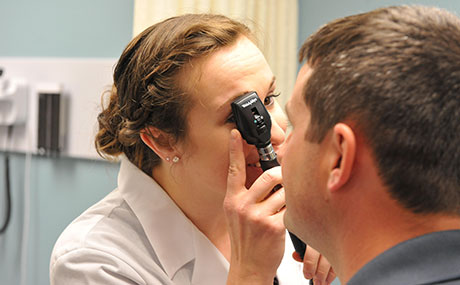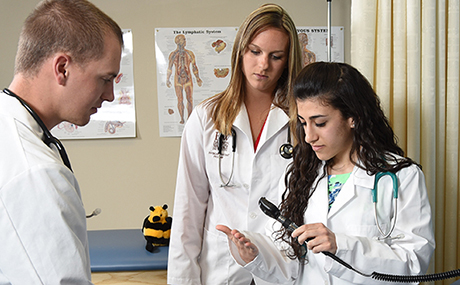Exceptional 100% physician assistant certifying exam rate sets BW apart
 The
superb
success
of
Baldwin
Wallace
University
physician
assistant
(PA)
graduates
continues
with
yet
another
graduating
class
achieving
a
100%
first-time
pass
rate
on
the
Physician
Assistant
National
Certifying
Exam
(PANCE).
The
superb
success
of
Baldwin
Wallace
University
physician
assistant
(PA)
graduates
continues
with
yet
another
graduating
class
achieving
a
100%
first-time
pass
rate
on
the
Physician
Assistant
National
Certifying
Exam
(PANCE).
It is the seventh year in a row - since the program's first graduating class in 2015 - that all PA graduates passed on the first try, giving the BW program a perfect 100% lifetime passage rate, an achievement that stands alone in the state of Ohio.
Contributors to success
Dr. Jared Pennington, professor and chair of the BW PA program, attributes BW's superior outcomes to a variety of factors that start with the admission process and carry through to the classroom and clinical experience.
"We select excellent students who are passionate about the PA profession and work extremely hard during the program in order to become compassionate caregivers," Pennington explains.
"We also have long-standing faculty members who have been with the program since the inception and are dedicated to the education and success of our students," he continues. "Not only do we enjoy perfect pass rates each year but also above national average in almost all, if not all, categories on the board examination."
Job market advantage
 The
timeline
of
the
BW
program
is
also
distinctive
in
Ohio
and
offers
a
leg
up.
BW's
24-month
Master
of
Medical
Science
PA
program
begins
in
May
each
year,
which
qualifies
students
to
sit
for
the
PANCE
exam
and
pursue
employment
opportunities
in
May,
earlier
than
any
other
graduating
PA
classes
in
the
state.
The
timeline
of
the
BW
program
is
also
distinctive
in
Ohio
and
offers
a
leg
up.
BW's
24-month
Master
of
Medical
Science
PA
program
begins
in
May
each
year,
which
qualifies
students
to
sit
for
the
PANCE
exam
and
pursue
employment
opportunities
in
May,
earlier
than
any
other
graduating
PA
classes
in
the
state.
"Graduating our class in May allows for students to apply for their board exam, jobs and their medical license at a time of year that not many graduates are applying," Pennington notes. "This gives them an advantage in the workforce with less competition for jobs with other PA graduates."
Close-knit community
Since its inception in 2013, the BW program has graduated 189 physician assistants. Both Pennington and Dr. Mark Gersten, professor and medical director for the program, say small class sizes and a supportive "family environment" create a framework where students, faculty and alumni thrive.
"Our alumni stay very involved and in touch with the program," Gersten adds. "Many are now clinical preceptors, give guest lectures or assist the program in other skill-building areas. Several of our alumni have already assumed leadership positions at their institutions as well."



